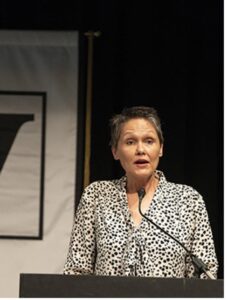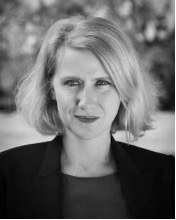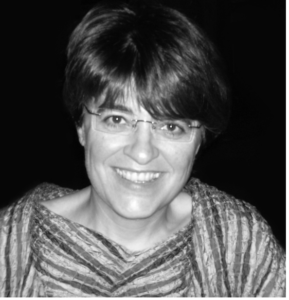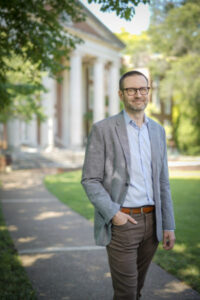Research Overview
Dive Deep. The Max Kade Center for European and German Studies unites a group of nationally and internationally acclaimed, widely published faculty members. EUS courses and a significant number of conference, workshops, lectures, and roundtable discussions at the Max Kade Center give students an opportunity to participate in scholarly debates and gather ideas for their own projects, including Immersion endeavors, final projects for the major, or honors theses.
Research Spotlights
JOY CALICO
 University Distinguished Professor of German, Russian, and East European Studies
University Distinguished Professor of German, Russian, and East European Studies
I am a musicologist, and I chose three current projects that give an idea of my interests. First, I am writing a book about operatic convention since Richard Strauss’s Salome (1905). That means I get to attend, listen to, analyze, and think about a lot of radical music theater by people like Olga Neuwirth, Du Yun, and Chaya Czernowin, as well as relatively accessible operas by artists like Kaija Saariaho and Missy Mazzoli, trying to figure out how genre conventions transcend musical and dramaturgical style. Second, I recently began learning MEI (Music Encoding Initiative), and I’m working with students and music librarian Jake Schaub on a music encoding project using music manuscripts in VU Special Collections. Third, I am writing a book chapter about music in East Germany for a GDR cultural reader that moves beyond my previous expertise in GDR art music to include pop, punk, rock, and jazz.
EMILY GREBLE
 Professor of German, Russian, and East European Studies, History, and Jewish Studies
Professor of German, Russian, and East European Studies, History, and Jewish Studies
As a historian of the Balkans, my research takes me to off-the-beaten-path archives on a quest to understand how local stories can shed light on regional, international, and theoretical questions about war, state-building, religion, and the meaning of Europe. My first book, Sarajevo, 1941-1945: Muslims, Christians, and Jews in Hitler’s Europe (Cornell, 2011) explores how people living in a multi-cultural city in Yugoslavia responded to Nazi occupation, civil conflict, and genocide. My second book, Citizens after Empire: Balkan Muslims and the Making of Modern Europe (Oxford University Press), explores how diverse communities of Ottoman Muslims living in new European states—Serbia, Montenegro, Austria-Hungary, and Yugoslavia—experienced and negotiated citizenship, nation-building, and new legal systems, and how Islamic institutions, like a Shari’a judiciary, became integrated into modern European state structures. The book challenges presumptions that Muslims are not part of the European historical narrative and calls for a new way of thinking about and writing the history of Muslims in Europe.
Looking ahead, I have two research projects that excite me. The first project considers how local communities and “ordinary” people living in peripheral regions of Yugoslavia—such as Muslim women in the Sandžak, Dalmatian fishermen on Adriatic islands, schoolteachers in the mountains of Bosnia–responded to and participated in Communist revolution from 1945 to 1949. My second long-term project takes up the question: how did people living on the Ottoman-Habsburg frontier in the 19th century understand their place in a shifting political order? The project explores the concept of a European “frontier” and conflicting understandings of sovereignty and rights through local legal encounters.
Letizia Modena
 Associate Professor of Italian and European Studies
Associate Professor of Italian and European Studies
I love cities, fiction and film, separately and combined. My research revolves around the interplay of place and identify, specifically, the intersections of literature and film with architecture and urban studies. In Italo Calvino’s Architecture of Lightness: The Utopian Imagination in an Age of Urban Crisis (Routhedge, 2011), I revealed Calvino’s sustained dialogue with architects and urban planners in the 1960s and 70s.
Presently, I am mapping out a book that explores the complex and continuous exchanges between a selection of Italian 20th- and 21st-century novelists, architects, and urban planners. In it I explore ways in which contemporary Italian fiction might renew our perception of the city. More immediately, how can literature enhance our individual and collective relationships to the built environment and social realities of the 21st century?
According to Calvino, the public intellectual “helps us forget that which we recall too well: ideas given to us, words given to us, images given to us, which stop us from seeing and thinking and saying the new.” This assertion struck me a lot, several years ago, compelling me to interrogate the ethical dimensions of literature in relation to the imagination and cognition. How might fiction make us “see and think and say the new,” as Calvino put it, in a way that contributes to a better understanding and planning of the city? Conversely, how can urban studies possibly contribute to fictional narrative? What do architects in particular take from literature and what might they give back? Is such an exchange even possible, and, if it is, how and why is it relevant to literary and cultural historians such as ourselves?
CHRISTOPH ZELLER

Professor of German and European Studies
A trained literary scholar and historian, I am interested in the metamorphosis of media. My research is dedicated to the ways we see, hear, and imagine the world through signs—from the spoken and written word to the representation of digitized code on screens. Correspondingly, I deem aesthetics a salient feature of the human condition. I have recently engaged in projects that ask what we mean when we say “authentic” and what is included when we speak of “values.” What kind of values guide our actions; in what ways will values change under the condition of technological progress? My current works include: an ongoing analysis of the cultural skill of “collecting;” a monograph on “values” and their derivatives (e.g. money, knowledge, art, and garbage) in German literature and art between 1890 and 1933; and a book-length study of depictions of the archive in eighteenth and nineteenth century German literature.
